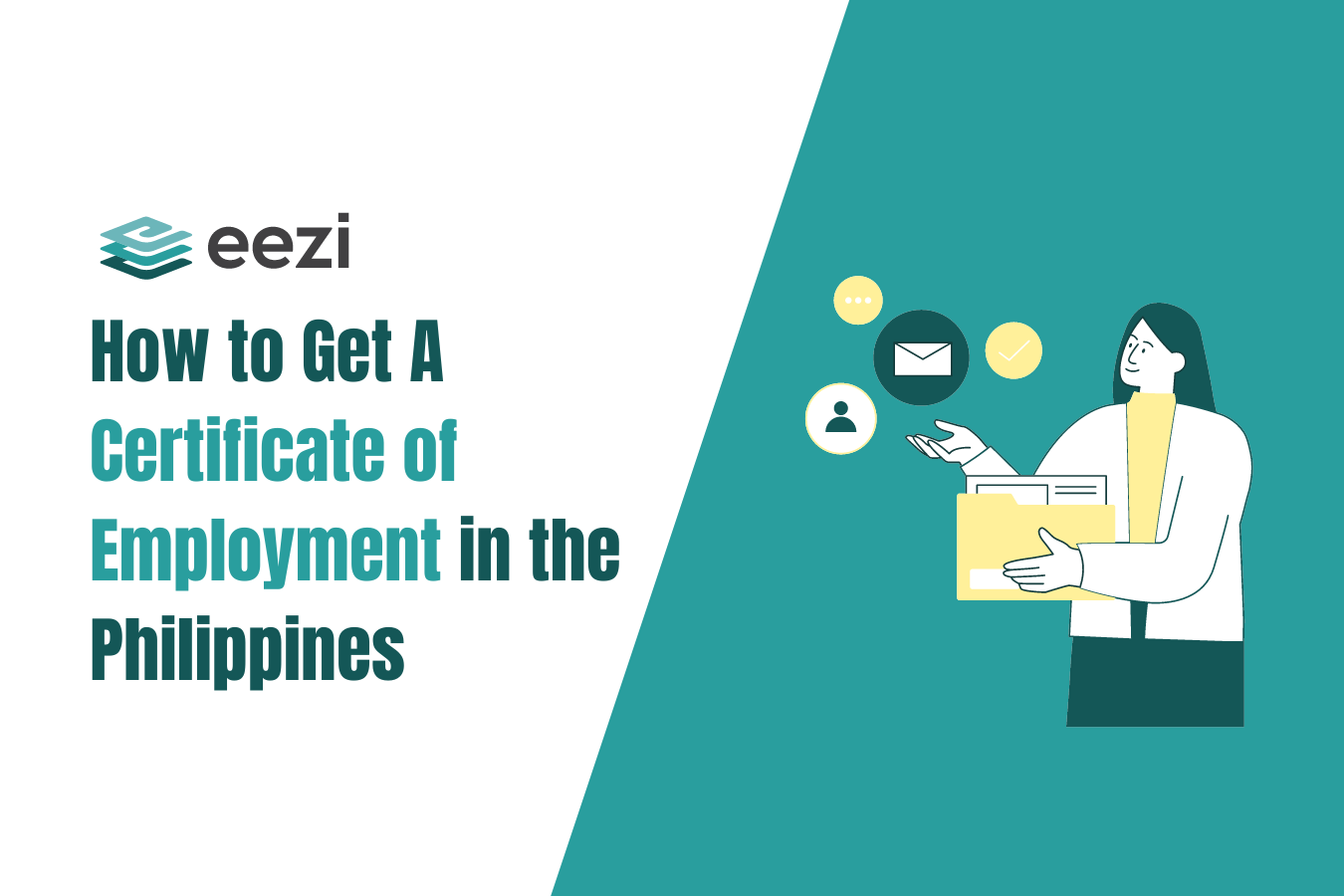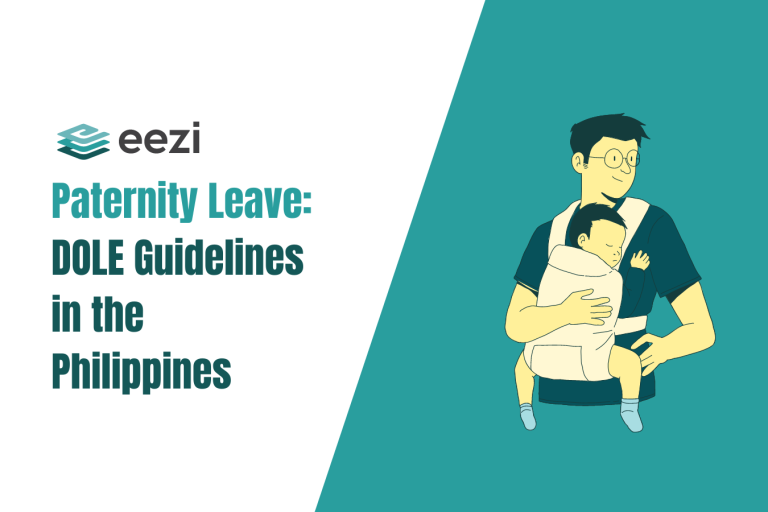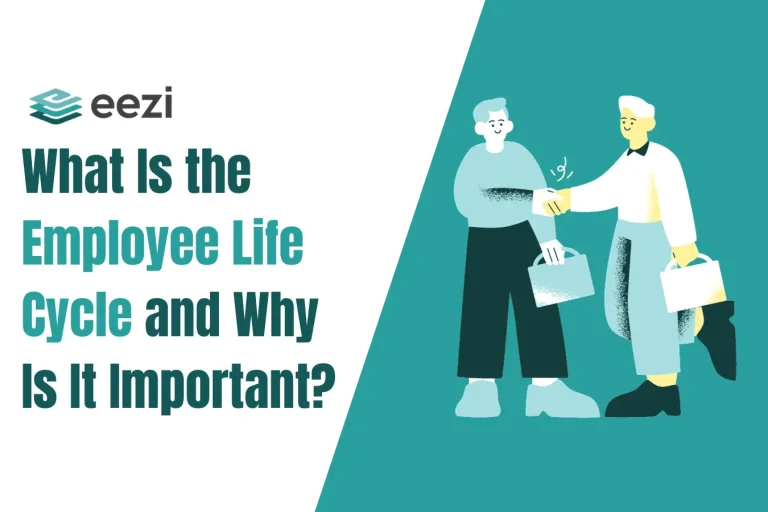How does one request a Certificate of Employment Philippines?

Job seekers, especially those with previous work experience, will need a Certificate of Employment or COE when applying for a new job.
Potential employers require a certificate of employment to help them determine if the applicant is qualified for the position applied for.
A COE shows that the person has the proper credentials needed for the job. It is a formal record of an individual’s employment history, covering important data such as the duration of employment and the job title held.
In this article, we will discuss the significance of the COE, how to obtain one, and the legal requirements that come with it.
What is a Certificate of Employment (COE)?
A COE or Certificate of Employment is a document that details your employment history with a current or prior employer.
It certifies that the person bearing it held the position or job title indicated, as well as the start and end dates of the employment. Moreover, it is an essential document that provides evidence to potential employers that you are eligible and qualified for the new position you are applying for.
In short, a Certificate of Employment is a document that certifies an employee’s engagement with a company. Typically, this certification includes the following details:
- Date of engagement with a company
- The work they do/did
- Their termination date (if applicable)
- Current pay
- Length of service in the company
The certificate should only indicate the employee’s termination from the company if the employee has been separated from work.
Furthermore, the type or nature of the work in the COE must include the position or title held.
How to request a COE in the Philippines
Only the current or former employer can release a COE for a present or terminated employee.
As such, the employee requesting the COE must get in touch with the Human Resources Department (HRD) of their current or former place of employment to receive a COE or Certificate of Employment.
The labor code, Omnibus implementing rules, and labor advisories do not require that the request be in writing. Hence, a verbal request may suffice.
However, some company policies may strictly require that requests for COEs be in writing. In this case, it would be prudent to send the request as instructed. Thus, the employee may need to submit a request letter for certificate of employment.
Usually, an employee requests a COE from a previous employer to prove they have worked there. Otherwise, they would need to request a COE from their current employer’s HRD for purposes other than proving prior employment.
What should be in the letter when requesting a COE?
The request letter must primarily include the requesting party’s name, address, and contact information. Moreover, the reason or purpose of the request should also be specified.
If the COE is required by the current employer, the request letter can also include his or her signature.
Related: Employee Data Privacy Rules
Labor Code governing the release of a Certificate of Employment
The Labor Code regulates the issuance of a Certificate of Employment in the Philippines. Employers are required to offer a COE at an employee’s request, provided that the request is made after the employee has resigned, been dismissed, or fulfilled their contract. Employers cannot refuse to give a COE without a valid reason, such as pending clearance issues.
The Implementing Rules and Regulations of the Labor Code of the Philippines indicate that:
- A dismissed employee is entitled to request for and receive a Certificate of Employment from his or her former employer.
- It should show the start and end dates of the employment.
- The certificate must also specify the type of work done by the requesting party, as well as the job title or position held.
(Section 10, Rule XIV Book V of the Omnibus Rules Implementing the Labor Code)
Information in a Certificate of Employment
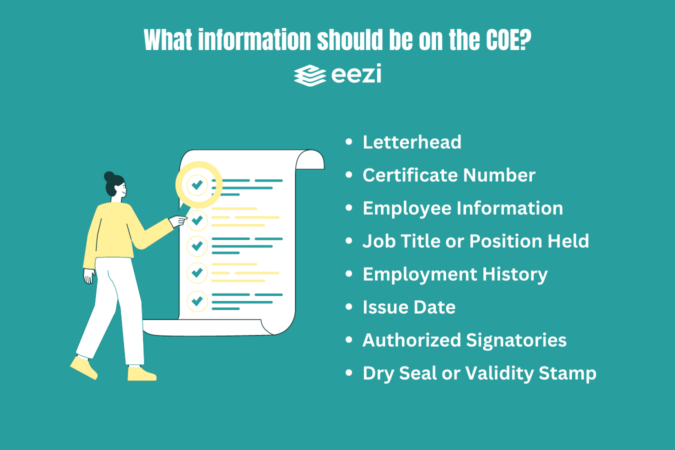
A COE must include the following details:
- Letterhead: The letterhead should include the official logo, the complete name of the company or issuing entity, its physical address, and contact information.
- Certificate Number: A certificate number should also be included, if applicable.
- Employee Information: The requesting employee’s complete name should be indicated legibly on the certificate of employment. Other information, such as the employee’s address and contact information, may also be included.
- Job Title or Position Held: The certificate of employment should clearly specify the employee’s job orientation or position. The start and end dates the employee served in that position or office must also be stated.
- Employment History: If the requesting employee has multiple positions or titles held during his or her employment in the previous company, those may also be stated in the certificate. However, if the employee has lateral transfers or has held positions in different departments of the company, he or she may request a separate COE for each job post held.
- Issue Date of the COE: The certificate of employment must clearly specify the date of issuance.
- Authorized Signatories: Signatures of the authorized person(s) involved in the issuance of the Certificate of Employment should be included before issuing the document to the requesting party.
- Dry Seal or Stamp of Validity: The Certificate of Employment must bear the company’s seal or stamp to supplement its validity further.
What is a Certificate of Employment with Compensation?
A Certificate of Employment with Compensation is a formal document issued by an employer to an employee upon request or as part of employment verification. It serves as a written confirmation of the employee’s tenure with the company and provides information about the compensation and benefits they receive.
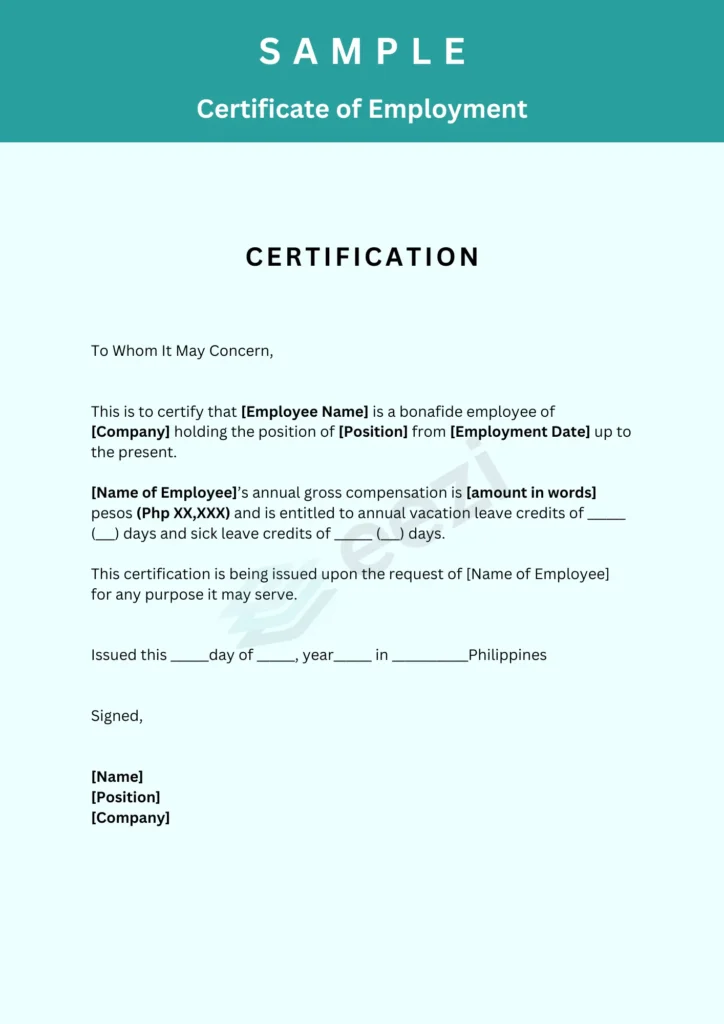
This Certificate of Employment with compensation typically includes the following details:
- Employee Information: The certificate includes the employee’s full name, job title, department, and employment dates (start and end, if applicable).
- Compensation Details: It outlines the employee’s salary, including basic pay and any allowances or benefits, such as bonuses, overtime pay, and other forms of compensation.
- Employment Status: The document indicates whether the employment is full-time, part-time, or contractual.
- Job Description: A brief description of the employee’s responsibilities and duties might be included.
- Company Information: The name and address of the company, as well as contact details for verification purposes.
- Attestation: The certificate is usually signed and stamped by a company representative, often the HR manager or an authorized signatory.
- Purpose: Sometimes, the certificate will mention that it is issued for a specific purpose, such as loan applications, visa applications, or other official matters that require proof of employment and compensation.
Employees often request this certificate when applying for loans, housing, visas, or other purposes that require verification of their employment history and compensation. It’s a way to provide official documentation to third parties or government agencies that confirms their income and employment status.
The main purpose of a Certificate of Employment
What are the common reasons for requesting a certificate of employment?
- A certificate of employment is a requirement when applying for a new job.
- It informs your current employer of what position or field of work you held in your previous job.
- It helps your new employer determine if you are qualified for the job or position you are applying for.
Other uses for a Certificate of Employment
Employees may need a COE when applying for services and utilities such as power and water lines installation, home phone installation, internet connection, and cable TV services. Moreover, it serves as proof that the employee is currently employed and that they have the capacity to pay. Ultimately, it shows the existence of an employment relationship between the employee and the employer.
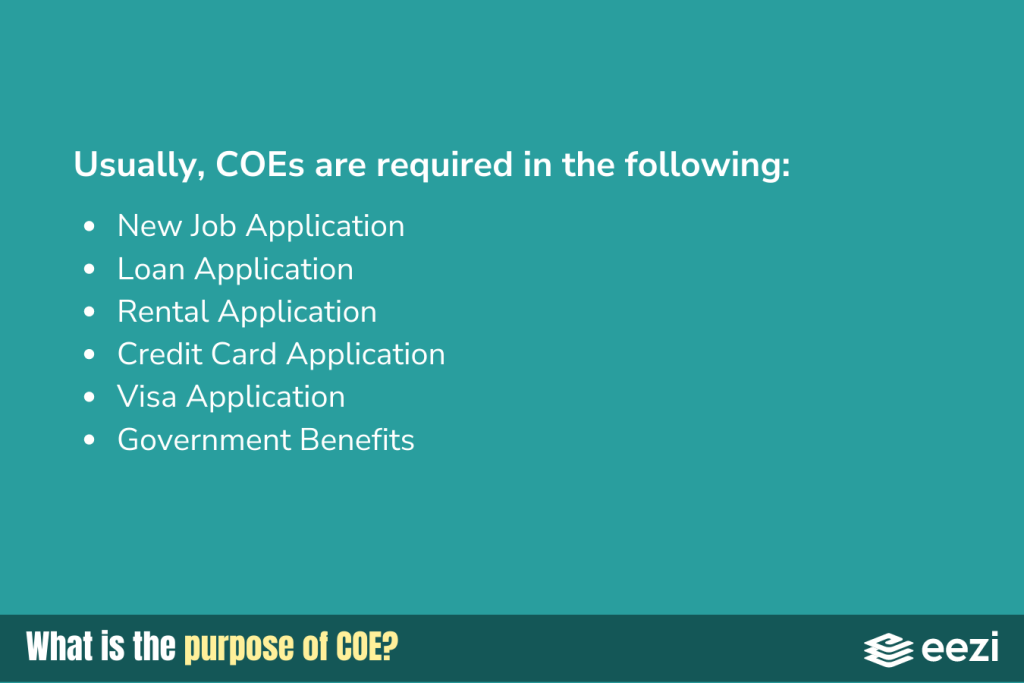
The Certificate of Employment may also be requested and used for the following purposes:
New job application
Most companies ask for a COE as a requirement in the candidate assessment process. That is if you indicate that you have worked for another company previously. Sometimes, your future employers may also want to contact your previous company.
This is to check whether you have indeed worked for them and to learn of the nature of your previous work. The COE works as proof of work experience.
Related: DOLE Rules for Resignation in the Philippines
Loan application
Banks and other loan agencies need guarantees that those who apply for loans with them have the capacity to pay their loans.
One such guarantee is the COE, which certifies that the loan applicant is currently employed and earning.
Some banks and loan agencies require the compensation of the loan applicant to be included in the COE.
Rental application
Rental companies and agencies, even independent individuals who rent out rooms, houses, or vehicles, may ask for a COE as a requirement to rent properties. The COE will serve as proof that the rent applicant has the ability to pay the rent.
Credit card application
As with loan applications, banks often require a COE to avail of a credit card if you’re employed. Moreover, the salary indicated in your COE largely affects the approval of a credit card and your maximum credit limit. The COE implies your capacity to pay and up to what amount.
Travel Visa application
The Certificate of Employment can be provided upon filing for travel visa as a guarantee to foreign country officials of your desire to come back to your country after visiting theirs because of your job.
This helps you secure travel visa to foreign countries you wish to visit. The Certificate of Employment or COE helps convince foreign officials to believe that you only wish to visit, instead of using a travel visa to illegally stay in their country and find work, which is what other people do.
Government benefits
In order to avail of some government benefits, one of the requirements is the Certificate of Employment. Failure to present a COE may be a reason to be disqualified from such benefits.
Who can request a Certificate of Employment or COE?
As per DOLE Labor Advisory 06-20, all current employees and dismissed workers have the right to send a request letter and receive a Certificate of Employment, regardless of the status of their employment. Contractual employees, whether currently employed or dismissed, may also request a COE.
Who should issue your COE?
Typically, your employer will provide you a COE directly. However, other types of employment have a different mechanism for releasing these certificates.
- Overseas employment: Your foreign employer should issue you a certificate of employment. Otherwise, you can obtain the document from your employment agency.
- Contractual or sub-contractual work: Your employer (contractor or subcontractor) should provide you with a COE. A client cannot issue you the certificate.
- Work as an independent contractor or freelancer: Your clients can provide you with a certificate of service (COS) or an attestation confirming that they worked with you within a specific timeframe. Instead of a COE, you may submit any of these documents to potential employers or clients.
How is COE different from clearance?
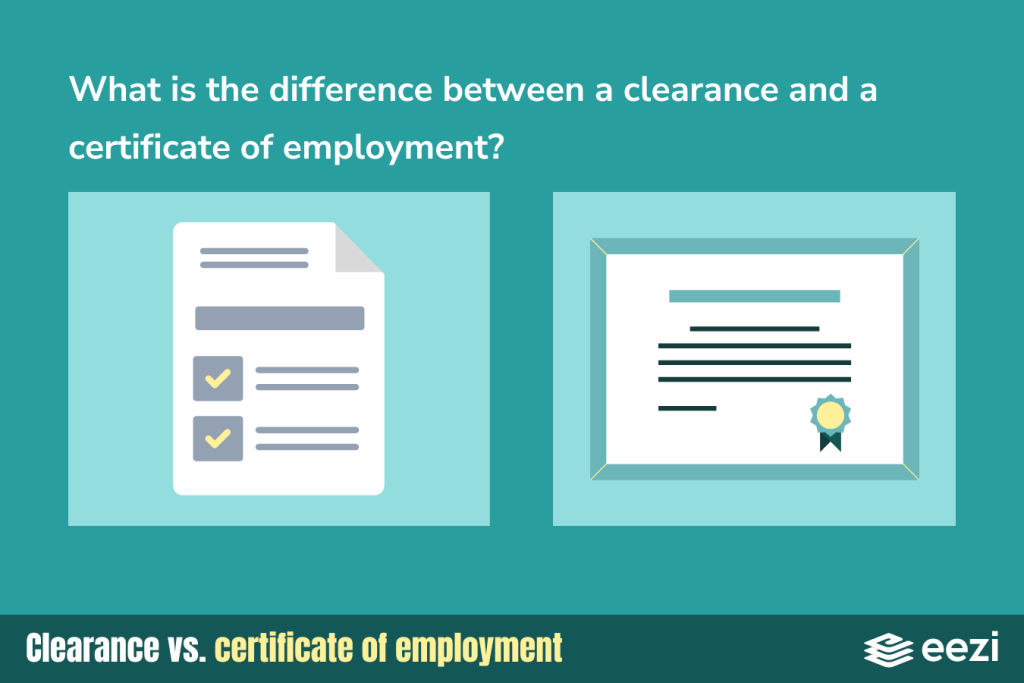
The Clearance and the Certificate of Employment released by the company are two separate entities that serve different purposes.
First, the Certificate of Employment is a document that establishes that the employee is working or has worked for a certain employer for a given period of time.
Although the COE alone is not enough to establish an employer-employee relationship, it does prove the employee’s present or past employment status.
On the other hand, an employment clearance is given to an employee after all their liabilities, tasks, and other responsibilities have been fulfilled and completed.
Moreover, the clearance lists all unfinished or unsatisfied tasks that need to be completed before the employee can leave after the notice of resignation or termination has been issued. The clearance acts as a ticket to leave the company peacefully and legally.
Read: Learn how to handle employee documents according to the Data Privacy Law.
When is the best time to request a Certificate of Employment?
Since the COE serves many purposes aside from proving prior employment, the best time to request a COE is when you need it. For instance, an employee may request one from their current employer for credit card application or international travel.
However, the COE can be released at any time after the termination date of employment. Furthermore, the issuing employer or company must provide the document upon the employee’s request.
Generally, employers are required to issue the Certificate of Employment within three (3) days from the request date.
Employer-employee relationship and its impact on your Certificate of Employment
Persons who are no longer employed by a company can rightfully request a COE. The laws in the Philippine Labor Code also back this right. Furthermore, employers are required by law to issue a COE upon request.
However, the requesting party cannot dictate what his or her employer should indicate in the certificate. The information must be based on company records and how the employee performed during his or her tenure.
FAQs
General questions
What other information is in the COE for employees in the Philippines?
Aside from the necessary information mentioned above, the rest are optional. For example, the employer can decide whether or not to include the reason for the employee’s termination from work.
Suppose the requesting employee has been terminated due to a Just Cause or serious misdemeanor. In that case, the employer is within their legal rights to divulge such information. However, it might be disadvantageous for the terminated employee, especially if applying for a new job.
Is a Certificate of Employment mandatory?
In the Philippines, issuing a COE is governed by laws in the Labor Code. An employer is required to provide an employee with a certificate of employment upon request. The document should be issued within 3 days from the request date.
Why do I need a certificate of employment?
The major function of a COE or certificate of employment is proof that the employee has worked for that company and describe the type of work that was done. The company’s hiring department will review your qualifications based on your employment record and history.
Technical rules
Who is entitled to request for a Certificate of Employment?
All workers are entitled to request for a Certificate of Employment from former employers, for whatever purposes they need it for.
Can an employer refuse to issue a Certificate of Employment?
Every employer is required by law to issue a Certificate of Employment upon request of the employee.
Should the COE request be in writing to ensure its release?
As per the DOLE Labor Advisory (LA), the employer must release the COE within three days upon request. The LA 06-20 does not specify whether the request must be made in writing to be considered valid.
Therefore, any form of request, verbal or written, is considered sufficient for the release of COE. Failure to comply is grounds for legal action against the employers.
Specific scenarios
Which scenarios may prevent an employer from issuing a COE?
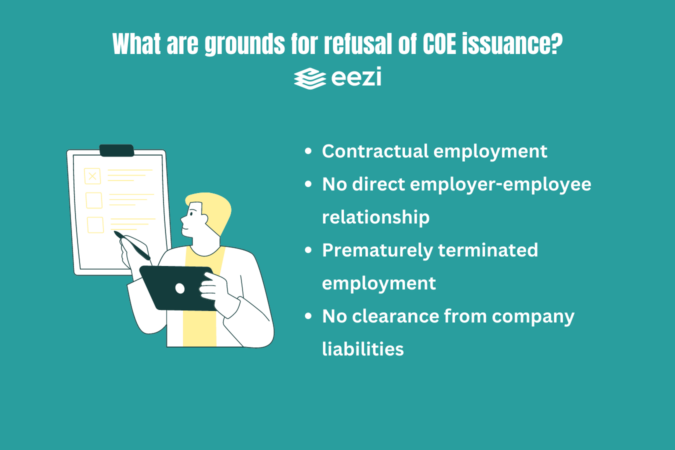
The following are situations or instances that the employer may refuse issuing a COE to a requesting employee:
- The employee is not yet cleared from company liabilities.
- The job or position held is contractual or project-based;
- There is no direct employer and employee relationship, such as with freelance jobs
- Employment is prematurely terminated by authorized or just cause;
- The employee is not yet cleared from company liabilities.
Can a project-based employee be denied his or her COE?
Employers may define a “worker” as someone employed on a regular basis, such as those that earn monthly wages. However, the Philippine Labor Code states that a “worker” means any member of the labor force, so long as he or she is for legal working age. As such, this covers all workers, whether employed or otherwise.
(Article 13 A, Chapter 1, Title 1, Book 1 of the Philippine Labor Code)
What is the legal basis for the COE?
The DOLE Labor Advisory no. 06, series of 2020, lays out the guidelines on final pay. Furthermore, it covers the issuance of the Certificate of Employment. This is in accordance with Articles 4, 103, 116, and 118 of the Labor Code and Section 10, Rule XIV, Book V of the Omnibus Rules implementing the labor code.
The Omnibus rules implementing the labor code is in Section 10, Certificate of Employment under Rule XIV of Book V. This section states that a worker who has been dismissed from work is still entitled to receive a COE.
Such certificates should specify the dates of the start and end of their work and the nature of the work they performed.
COEs for current employees
Can a worker who is still employed request a Certificate of Employment?
Yes. An employe may request for a COE when applying for services and utilities, bank and auto loans, and other purposes required by the requesting party. This is stipulated in the Labor Advisory issued by the Department of Labor and Employment (DOLE) in the Philippines.
What positions or job titles can be specified in a COE?
If the requesting employee has held multiple positions with varying job titles during his or her tenure with the former employer, the requestor can choose to tailor which position or title should be included in the certificate. This can be indicated in the request letter.
When using a COE to apply for utility installations, bank and auto loans, and other financial-related services, the requesting party may choose to include all positions and titles held.
This is to further confirm proof that he or she is duly employed, and has the means to pay for the services or utilities subscribed to.
Can an employer issue a COE beyond three (3) days?
No. The law strictly specifies that employers’ issuance of a COE should be within 3 days from the date of request.
Should the employer fail to do so, penalties may be incurred if the requesting party refers the case to the Department of Labor and Employment.
Can an employee dictate what goes in a Certificate of Employment?
No. An employee can only request what they want to be included in the COE. However, the employer ultimately decides what the COE contains, aside from the employee’s start and end date of their work contract and the nature of their work responsibility or position at work.
Ensure accurate information in your employees’ COE
With eezi, you won’t have to guess which job title or position your employee held when providing them with their certificates of employment.
eezi’s dynamic and user-friendly interface allows you to input and update employee information as needed, so all data is up-to-date.
